NEWS
Expansion Project Complete at the Tibet Buddhist Theological Institute in Lhasa
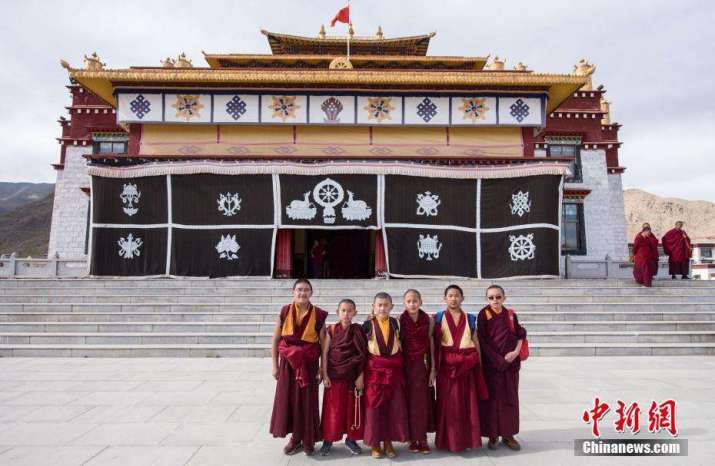 Young monastic students at the Tibet Buddhist Theological Institute near Lhasa. From chinatibetnews.com
Young monastic students at the Tibet Buddhist Theological Institute near Lhasa. From chinatibetnews.comThe Tibet Buddhist Theological Institute near the city of Lhasa, capital of Tibet Autonomous Region, is now able to accommodate more than 1,000 students following the formal completion of construction work on Tuesday, media reports revealed. The educational academy, which aims to promote the study of Tibetan Buddhism, first opened in 2011 with 150 students.
The expansion project represents the third phase of construction at the institute and covers some 43,550 square meters, adding facilities that include an auditorium, a library, and additional classrooms and dormitory accommodation.
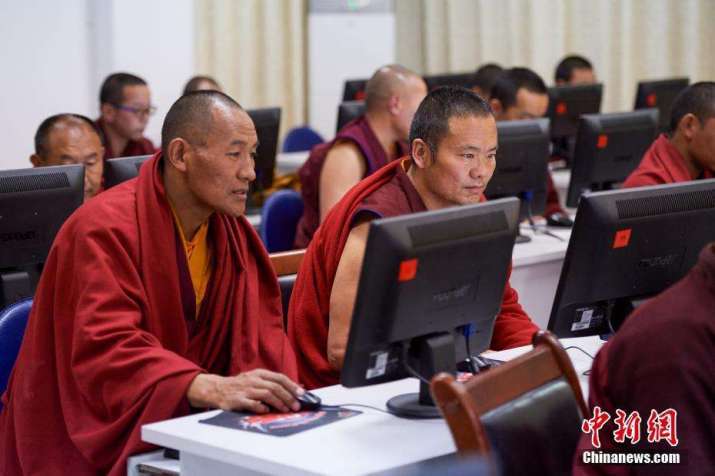 The students, who come from various temples in Tibet, study not only Buddhism but also law and culture. From chinatibetnews.com
The students, who come from various temples in Tibet, study not only Buddhism but also law and culture. From chinatibetnews.comLocated in Nyetang Township, Quxu County, southwest of the city of Lhasa, construction of the Tibet Buddhist Theological Institute began in October 2008 and it commenced accepting students in 2011. The first class of monastic students graduated from the institute in 2013. Featuring Tibetan-style architecture, the institute was built with a total investment of 103 million yuan (US$15.8 million).
The academy’s president, Zhukang Tubdankezhub, described the Tibet Buddhist Theological Institute as the region's first high-level comprehensive Buddhist academy, adding that it aimed to instill a love for both for China and Buddhism among the monks and nuns who study there.
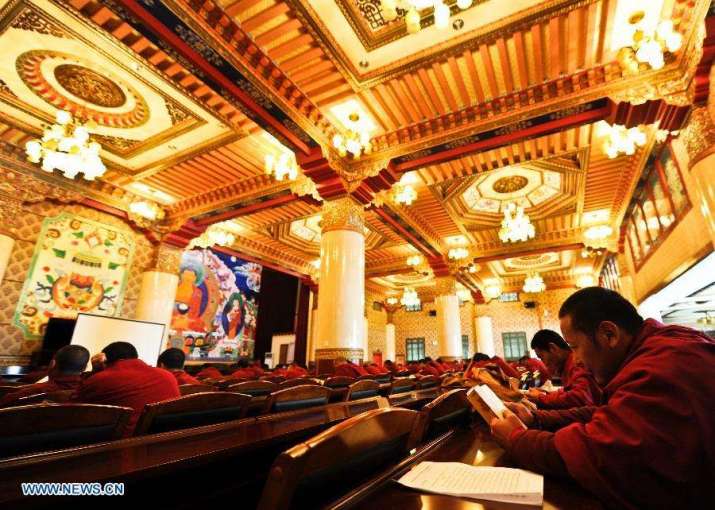 Monks study in the Tibet Buddhist Theological Institute. Photo by Purbu Zhaxi. From en.people.cn
Monks study in the Tibet Buddhist Theological Institute. Photo by Purbu Zhaxi. From en.people.cnQuxu County is also home to trhe renowned Nyethang Drolma Lhakhang, a buddhist monastery connected with the Kadam school of Tibetan Buddhism and the Buddhist master Atisa (982–1054). It is also one of the few major monasteries in Tibet to have survived China’s Cultural Revolution with little damage.
The Tibet Buddhist Theological Institute offers three main programs of study running in length from 2–4 years. Two of the courses focus on exoteric and esoteric Buddhism, respectively, while the third is specifically designed for students recognized as “living buddhas” or tulkus.* All students are required to attend classes on Buddhist, cultural, and legal studies.
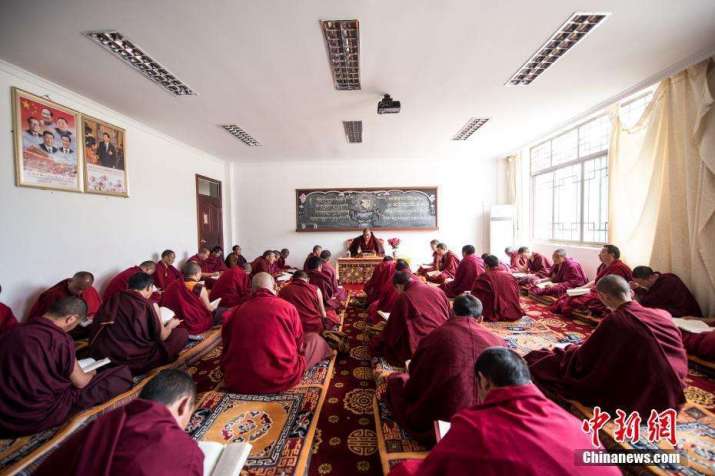 From chinatibetnews.com
From chinatibetnews.com“The environment and conditions here are good. Besides Buddhist scriptures, we also study all kinds of courses including Tibetan language, Mandarin, history, computers, and English," said Dainba Yarphel, a 45-year-old monk who has been studying at the institute for one year, and hope to graduate in another three years. (XINHUANET)
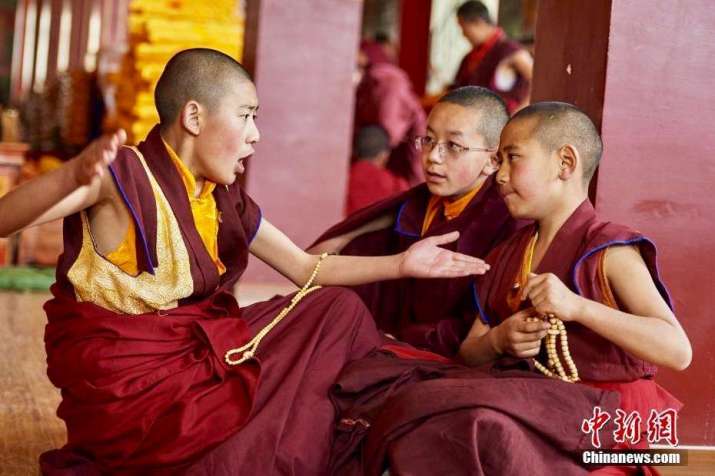 The institute also has a course of study that caters specifically to recognized "living buddhas” or tulkus. At present, there are six young "living buddhas" studying at the academy. From chinatibetnews.com
The institute also has a course of study that caters specifically to recognized "living buddhas” or tulkus. At present, there are six young "living buddhas" studying at the academy. From chinatibetnews.comIn 1987, the government-run China Advanced Institute of Tibetan Buddhism was established in Beijing, becoming the first government-sanctioned academy for the study of Tibetan Buddhism. Among other courses and qualifications, the institute allows monastic students to earn Geshe Thorampa degrees—one of the highest academic qualifications in Tibetan Buddhism. As of May this year, the institute has awarded the Thorampa title to a total of 148 monks.
* The Chinese word huofo (活佛), which literally means “living buddha” is often used to mean tulku—the recognized reincarnated custodian of a lineage of teachings. Early last year, China’s State Administration for Religious Affairs (SARA) published an online database of 870 “authentic living buddhas” in Chinese and Tibetan, which includes a name, ID number, photograph, date of birth, and monastery of residence for each officially verified tulku. In 2007, the SARA decreed that all reincarnations born within China must obtain government approval to be regarded as “valid.” Reincarnation applications must be approved by four different governmental bodies—the religious affairs department of the provincial government, the provincial government itself, the SARA, and the State Council.
See more
Tibet Buddhist Theological Institute gets larger (XINHUANET)
Brief introduction of Tibet Buddhist Theological Institute (WWW.XZXW.COM)
China opens Tibet Buddhist Theological Institute (TibetCtrip.com)
Tibetan Buddhist Thorampa title holders increase to 148 (TIBET.CN)
Related news from Buddhistdoor Global
China Appoints Communist Party Officials to Manage Larung Gar Buddhist Academy
China Publishes Database of Authorized Living Buddhas, Dalai Lama Omitted
China Compiling Database of Living Buddhas, Says Government Official
China Reasserts Authority on Dalai Lama Reincarnation
Related features from Buddhistdoor Global
Nuns in the Tibetan Tradition: Latest Developments and Future Prospects
Exclusive Interview: The 17th Karmapa and the Buddhist Nuns of the Tibetan tradition














